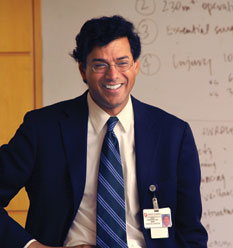Read This: The New Yorker’s Atul Gawande on “Why Boston’s Hospitals Were Ready”
If you haven’t yet taken the plunge and clicked on the über-popular New Yorker story, “Why Boston’s Hospitals Were Ready”, that’s making been the rounds on Facebook and Twitter this week, I implore you: Go. Read it. Now.
It was written by Dr. Atul Gawande, a New Yorker writer who moonlights (or maybe it’s the other way around?) as a surgeon at Boston’s Brigham and Women’s Hospital. He was part of that hospital’s team who took care of the victims following Monday’s blasts.
I will warn you, though: It’s not a particularly uplifting read. To wit:
Talking to people about that day, I was struck by how ready and almost rehearsed they were for this event. A decade earlier, nothing approaching their level of collaboration and efficiency would have occurred. We have, as one colleague put it to me, replaced our pre-9/11 naïveté with post-9/11 sobriety. Where before we’d have been struck dumb with shock about such events, now we are almost calculating about them. When ball bearings and nails were found in the wounds of the victims, everyone understood the bombs had been packed with them as projectiles. At every hospital, clinicians considered the possibility of chemical or radiation contamination, a second wave of attacks, or a direct attack on a hospital. Even nonmedical friends e-mailed and texted me to warn people about secondary and tertiary explosive devices aimed at responders. Everyone’s imaginations have come to encompass these once unimaginable events.
As I’m sure you’re able to suss out, the piece basically explains why so many lives were spared—and so few lost—in the wake of a terrible, terrible tragedy. The reason? That since 9/11, hospital workers are now more prepared than ever to deal with disaster. They’ve done drills, come up with contingencies, and learned how to manage their emotions and just get it done in the face of terrible circumstances. Which, when you think about it, is sort of a depressing bit of commentary on the state of the world.
But the flip side of the coin is this: The doctors, nurses, EMTs and support staff who work in our communities are freaking awesome. And we probably don’t thank them for being so nearly enough. So thanks for all the work you do, everyone in the medical field, and for being so well prepared to deal with the terrible blows that terrible people aim to inflict on us.
The end of the piece sums up how I think a lot of people are processing Monday’s events:
We’ve learned, and we’ve absorbed. This is not cause for either celebration or satisfaction. That we have come to this state of existence is a great sadness. But it is our great fortune.



